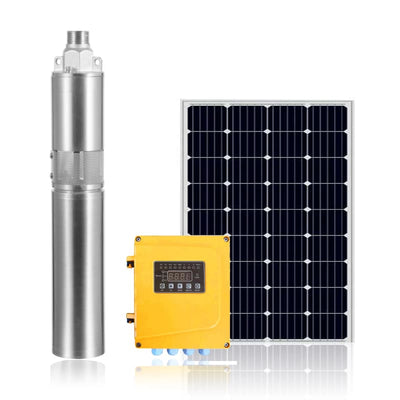
Commercial photovoltaic pumping solutions presents a low-cost green answer for water supply. Using photovoltaic energy these installations pump water from different origins including rivers, to fulfill the needs of farmers. Sun-driven pump solutions are reliable and utilize minimal maintenance, making them an ideal choice for both on-grid and off-grid applications.
Sunlight-driven pumping assemblies comprise of photovoltaic arrays turning sunrays into power, which then operates a pump. Multiple types of pumps are available, featuring centrifugal pumps, submersible pumps, and piston pumps, each matched with specific water lifting requirements.
- PV pumping solutions lessen fossil fuel use and promote cleaner ecosystems.
- Furthermore, these systems provide a steady water supply for off-grid locations with limited grid access.
- As a result, solar water pumping is growing in adoption worldwide as a sustainable water-management option.
Harnessing Solar Energy for Irrigation
Looking for a reliable and eco-friendly way to irrigate your garden? Pond-mounted photovoltaic pumps present an inventive approach, using sunlight to transfer pond water to farm plots. They represent an eco-conscious irrigation option that removes fossil fuel dependence and reduces ecological impact.
Low-maintenance long-life pond pumps make a budget-friendly method to secure ongoing water supply for agricultural use. Choose renewable-driven pond pumps to promote sustainability.
Submersible pumps powered by the sun offer reliable deep-source water access where grids are weak.
Sun-Driven Submersible Water Pumps
Where grid access is constrained, dependable water sources are vital for farming and daily life. Immersion pumps, traditionally fueled by electricity from the grid, can be costly to operate and maintain. However, recent advancements in solar power have paved the way for a more sustainable solution: submersible pumps powered directly by the sun. Modern PV-driven submersible systems generate power onsite to run deep-well pumps. This reduces reliance on fossil fuels and grid infrastructure, offering a budget-friendly alternative for accessing clean water.
Harnessing Sunlight for Water Access
Sun-derived power is especially promising for energizing water access systems. Introducing solar well pump systems - a revolutionary solution that combines sustainable power with reliable irrigation and domestic water supply. These innovative systems utilize sunlight to drive powerful pumps, effectively drawing water from deep wells, providing a consistent source even in remote areas where traditional grid access may be limited.
Moreover, solar well pump systems offer numerous features including reduced energy costs, lower carbon footprint, and increased energy independence.|These well pump systems deliver reduced operating expenses, decreased emissions, and greater autonomy.|Among benefits are lower energy bills, reduced carbon output, and strengthened energy sovereignty.} Tapping limitless solar power helps secure clean water access while protecting the environment for future generations.
- Visualize a world where every community, regardless of its location, has access to reliable and sustainable water sources.
- Solar well pump systems make this vision a achievable goal.
- Let's explore the profound impact of these systems on rural communities, agriculture, and the environment.
Go Green with Solar: Universal Water Supply Solutions
Water is essential for life and crop cultivation, but accessing it can be a struggle. Conventional techniques typically depend on fossil fuels and add to pollution. Thankfully, photovoltaic pumping offers a greener substitute. The system captures solar energy to transfer water with consistency and efficiency. Solar water pumps are ideal for a wide range of applications, from watering crops in remote areas to delivering safe drinking water in communities lacking traditional infrastructure. Zero fuel expenses and low upkeep make PV pumping an economical choice benefiting ecology and budgets. Here are core advantages of solar-driven water systems: * well submersible pump Clean energy production * Lower fuel expenses * Eco-conscious * Reliable performance * Quiet operation Transitioning to solar pumping supports a greener, cost-effective future.Solar Water Pumping
Maximizing PV pump efficiency takes an integrated and tactical method. Selecting the right solar panels, implementing efficient pumps, and optimizing system design are essential steps in this process. Harnessing solar input enables building stable and eco-friendly water pumping configurations for diverse needs.
- Considerations influencing efficiency include panel placement, temperature, and system maintenance.
- Technological advancements in solar panels and pump technology are constantly propelling the boundaries of efficiency.
- Insightful monitoring and control systems can further enhance performance and reduce operational costs.
Sustainable Aquifer Protection with Solar Well Systems
Fresh groundwater aquifers play a key role in agriculture, domestic use and commercial needs. But excessive pumping and climate impacts endanger aquifer sustainability. Addressing risks calls for alternative sustainable tactics such as PV well pumping, which is gaining momentum. PV pumps provide an efficient cost-conscious method to withdraw groundwater with reduced ecological footprint. By harnessing the power of the sun, these systems reduce reliance on fossil fuels and mitigate greenhouse gas emissions.
- Solar well pumps contribute aquifer recharge by regulating water use.
- They provide a reliable source of energy, ensuring access to clean water even in off-grid areas.
- Furthermore, solar well pumps minimize operational costs and maintenance requirements compared to traditional diesel-powered pumps.
The Power of the Sun
Beneath wells there exists stored potential energy ready for conversion. The sun, our constant friend, holds the key to unlocking this potential. Using radiant sunlight, we can sustainably fuel homes and livelihoods.
- Photovoltaic systems
- Collect
- Daylight
This renewable energy source offers a vast supply, allowing us to decrease our reliance on non-renewable sources. Embracing sunlight energy advances ecological responsibility and a brighter future.

Solar Water Pumping: A Renewable Energy Revolution
With rising water scarcity worldwide, novel approaches are emerging to address the problem. Solar water pumping, a technology that utilizes the power of the sun to lift water from ground sources, is achieving traction as a sustainable and cost-effective alternative to traditional methods. Using PV arrays, these pumps supply water for irrigation, animals, households and small hydropower use.
Advantages of PV pumping span many areas. It reduces reliance on fossil fuels, reducing greenhouse gas emissions and promoting environmental sustainability. Moreover, solar pumps offer operational independence, as they function without the need for grid connection or fuel storage. Consequently they fit remote contexts lacking dependable grid power.
- Moreover, solar water pumping systems are relatively low maintenance and have a long duration with proper care, resulting in long-term cost savings.
- The technology is also adaptable to various applications, ranging from small farm plots to large-scale agricultural operations.
Ultimately, solar water pumping represents a transformative shift towards sustainable water management. By embracing this renewable energy solution, we can guarantee access to clean water, empower communities, and make a difference in safeguarding our planet for future generations.
Solar-Powered Irrigation
Enhancing crop output naturally remains a common objective among agriculturalists. Photovoltaic irrigation systems offers an innovative and sustainable solution to this challenge. By harnessing the power of the sun, farmers can efficiently pump water directly to their crops, reducing reliance on traditional methods that often consume vast amounts of fuel. This environmentally responsible practice boosts productivity and fosters sustainability. Over time photovoltaic irrigation lowers running costs versus fuel-dependent systems.
- Merits of using solar-powered irrigation include:
- Lowered dependence on fossil fuels.
- Enhanced crop yields and standard.
- Optimal water utilization.
- Reduced operational expenses.
Harnessing Solar for Irrigation

Revolutionizing the way we water our gardens and landscapes, solar-powered watering systems are emerging popularity. They capture sunlight to power pumps that deliver water in an efficient sustainable manner. By converting sunlight into electricity, solar panels energize a pump that supplies water to plants, lowering reliance on traditional energy sources.
- Moreover, these systems are economical in the long run, as they reduce monthly electricity bills.
- In addition, solar-powered watering systems provide a green solution for watering, contributing to a more responsible future.
As the advancements in solar technology, these systems are becoming increasingly convenient, enabling homeowners and green thumbs to enjoy a more sustainable approach to watering.
